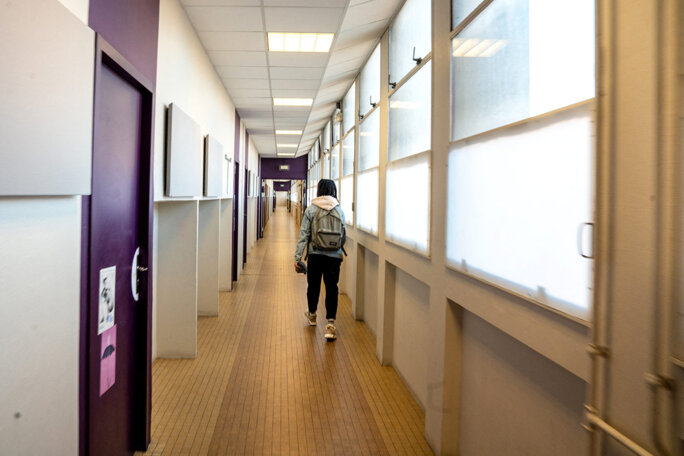France's Ministry of the Interior is at the centre of controversy after it emerged that dozens of schools in the country were asked to provide details on how many pupils were absent from the classroom during the recent Muslim festival of Eid. In some cases the demand for information related to absenteeism during Ramadan too. The revelations, which some fear shows evidence of potential discrimination against Muslims, have shocked the teaching community.
A number of headteachers in the Hérault and Haute-Garonne départements or counties in southern France received letters requesting the data at the end of April. These letters came either directly from the local police or via the local education authority, and asked the establishments to detail the number of pupils absent from primary, middle and secondary schools during Eid, the major festival which marks the end of Ramadan. In the city of Montpelier schools were also asked to log how many pupils had been absent during Ramadan itself.
The schools were nonplussed by the requests. In France there is nothing to stop a pupil taking a day off for Eid as long as the school is notified in advance, and there is no requirement to detail the cause of the absence. In fact, each year the official bulletin of the state education department, the Éducation Nationale, publishes a list of the major religious festivals that “might give rise to requests for permission to be absent”. The festival of Eid is one of these, as is the Buddhist festival of Vesak, the Armenian Christmas Day in January and the Jewish holy day of Yom Kippur. The Ministry of Education, meanwhile, has been at pains to make it clear that it was not behind this initiative.

Enlargement : Illustration 1

When the revelations about the affair broke in several newspapers on Sunday, the Ministry of Interior, via the junior minister in charge of citizenship, Sonia Backès, issued a statement acknowledging that it had asked for information in some regional education authority areas. The minister said that the schools concerned had been requested to provide “an estimate of the rate of absenteeism on the occasion of Eid-al-Fitr” but insisted that the names of those involved was not recorded – even though no one had claimed they had been. Explaining the initiative, the ministry said that it “regularly studies the impact of certain religious festivals on the functioning of public services, and in particular in the sphere of schools”.
However, teaching unions disputed this and said they had never before heard of this kind of request concerning pupils' school attendance rates during religious festivals. Nor, when asked on Monday by Mediapart, did Sonia Backès's ministerial office know either when or how this type of request had been made in the past, despite its categorical statement the day before.
The clearly-embarrassed ministerial office also denied that the demand for information was made at the “request of the Ministry of the Interior”. Instead, it referred to an “independent”, “clumsy” and “unfortunate” initiative made by a “person in charge of intelligence gathering who was carrying out research”. Yet Mediapart understands that the request came from at least two education authorities, which seems to contradict the idea that it was down to the actions of a lone regional police intelligence official. While it acknowledged the “legitimacy” of local police intelligence services in “asking for information”, the minister's office gave no details on who the “person in charge of intelligence gathering” was.
One education assistant, whose role is to supervise pupils during breaks and monitor absenteeism, and who belongs to a professional network in the Paris region and works at a diverse secondary school in the capital's 17th arrondissement or district, confirmed that no such demands had been made in that region. “In any case, absence on the days of religious festivals has never posed a problem,” she told Mediapart. “You just know that on certain days there'll be fewer people in the canteen, that's all.”
Sonia Backès's office said that local police intelligence services monitored “social events” on a “comprehensive” basis, including those involving the Catholic faith. “When there's a major service at Notre-Dame [cathedral] they make enquiries to find out how many people there will be,” her office said. In this case, though, the request to schools was sent after the end of Ramadan and Eid.
The Ministry of the Interior was also keen to highlight the “educational context” of this request for information, pointing to reports received by the Ministry of Education about a growing number of breaches of secular rules, in particular during Ramadan. “We've known for weeks, months even, that the Republic's schools have come under a number of attacks from some divisive groups, in particular Salafists and [groups sympathetic to the Muslim Brotherhood]. They're not particularly serious things but we're watching carefully, it's the little signals that we want to clamp down on,” said a source. That was why the local police intelligence chief had acted as they had, without any special request to local prefects or education authorities, in order to “give them an idea, a trend”.
The response on the ground to the requests over Eid absenteeism was mixed. In the two education authorities involved there has been a degree of backtracking, with assurances from senior management in those regions that they had – in the end - asked staff “not to take any account” of the requests. “In our school the CPE [editor's note, a senior member of the non-teaching staff in charge of discipline] was on holiday when she saw this email and my management didn't really know what to do, so she asked them pass on the overall absenteeism rates in percentages for Eid,” complained 'Adèle' – not her real name – a teacher in a large middle school in Toulouse. “Since then it's been hard to get a clear view on what was sent and what was done with these [absenteeism] rates,” she added. Soon afterwards, she said, “counter instructions” had been issued not to take any notice of the requests. But in the meantime “schools had had little room for manoeuvre”, the teacher said.

Enlargement : Illustration 2

But despite being put in this position, some schools were so shocked they immediately declined to comply with the data request. “The office staff passed the email on to us, we looked at it, and we jokingly said that we'd report it as a violation of secularism because it was simply unbelievable,” said another CPE in a large group of schools in Montpellier. “Being absent on the day of a religious festival is a right. What did they think, that we were going to track the pupils to find out if they'd really celebrated Eid? But the instruction came from on high. So, we thought about it. And we decided - we were clear about this - that we weren't going to do it,” said the CPE. The senior management's subsequent instructions to ignore the data request then reinforced their initial decision.
In both middle schools and secondary schools it is the job of the CPE – 'conseiller principal d'éducation' - to check on pupil absences. In primary schools, however, this role falls to the headteachers. “When I got back from holiday on May 8th I saw this email from the person in charge of security at the local police station asking me for the number of pupils absent on the day of Eid, and requesting me to confirm I'd received the email,” said one headteacher of a primary school in the Grand Mirail district of Toulouse. “This was the person you normally call when you see someone hanging around near the school, that kind of thing,” she said. “This email caused me a lot of problems, I didn't want to have anything to do with it.”
On May 10th the local education inspector for that school told the headteacher to respond to the request, and she informed the school's trade unions as well as several colleagues who, like her, were outraged and unsure what to do. “As of now I haven't received any counter-instructions,” said the headteacher. “I take comfort from the general stance and the media impact of this affair but the reality is I've still had no official response on the direction to take,” she said.
“For the Hérault education authority to pass on this form of request, even if there was backtracking later, still poses problems,” said Armand Roussel, a member of the SNES-FSU teaching union in Montpellier. “The [school] inspectors don't have to obey [the Ministry of the Interior]! And this whole saga of targeting the Muslim community is scandalous.”
Last Monday the main civil service teaching union, the Fédération Syndicale Unitaire (FSU), wrote to interior minister Gérald Darmanin, reminding him that students taking a day off school for major religious festivals was one of the “guarantees of freedom that are the basis of the equality that allows secular principles to be applied in schools and educational establishments on a daily basis”.
The union also raised a number of questions with the minister. “The different explanations quickly given by your services locally or via the press don't enable us to know at this stage what the nature of the national request by the Ministry of the Interior's central services was, nor through which channels this request was made,” wrote the FSU. “We also want to know what these statistics will be used for, as the explanation put forward about an assessment of the 'impact of certain religious festivals on the functioning of public services' is no answer, and acknowledges the discriminatory targeting that this initiative constitutes.”
Meanwhile the anti-racist association SOS Racisme criticised what it called the “casual nature” of the Ministry of the Interior's responses, and also raised questions of its own. In particular, it wanted to know about the involvement of police officers from the local Direction Départementale de la Sécurité Publique (DDSP) – the police authorities that oversee public safety locally - in the operation. SOS Racisme said their involvement helped contribute to a “de facto link between the presumed Muslim religion of the children and security issues”. The association also asked “in what respect is the Ministry of the Interior more competent than the [education authority] to enquire about the functioning of the National Education public service?”.
Speaking on France Info radio, the junior minister for youth issues, Sarah El Haïry, hit back at the anti-racist association and said such comments were “shameful”. She declared: “In our country we have two extremes at the moment: one that's trying to oppose the French people and heap scorn on a religious practice; another section of our country is trying to concoct a fake row over something which is, essentially, a snapshot of the working of our public services at a given moment.”
Despite the government's attempts to defuse the situation, the mood in the staff room where Adèle teaches in Toulouse is still not calm. “Frankly, what's happened is even a bit scary,” she said. “Some Muslim teaching colleagues who asked for the day off also feel targeted. They wonder if they, too, will end up being a statistic somewhere.”
--------------------------------------------------------------------------
- The original French version of this article can be found here.
English version by Michael Streeter


